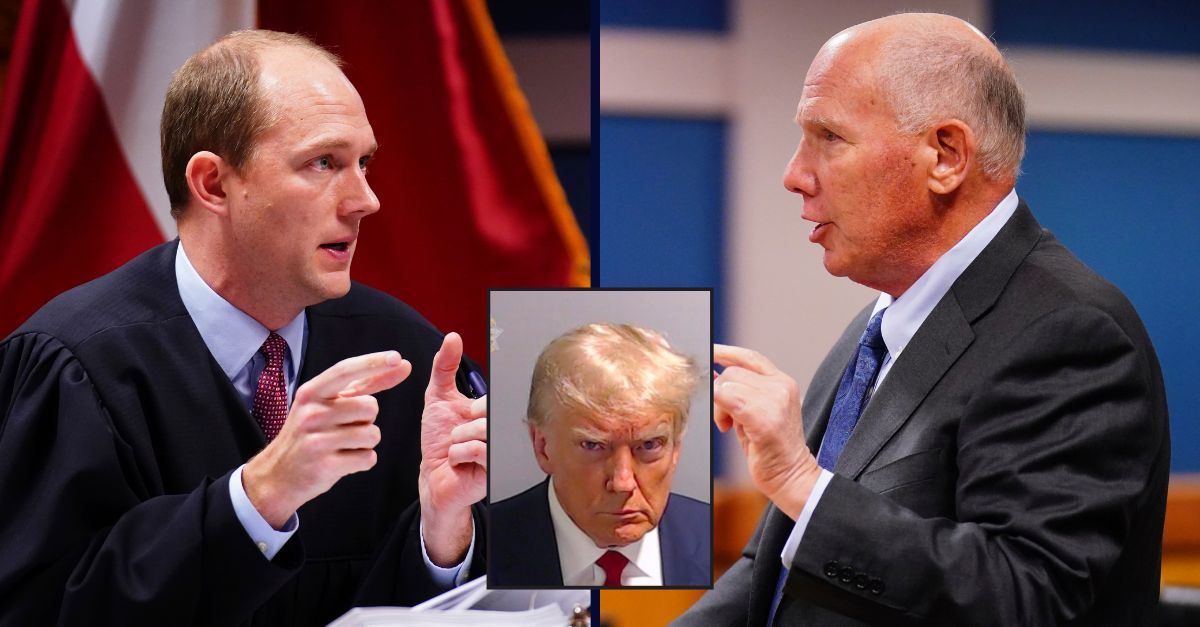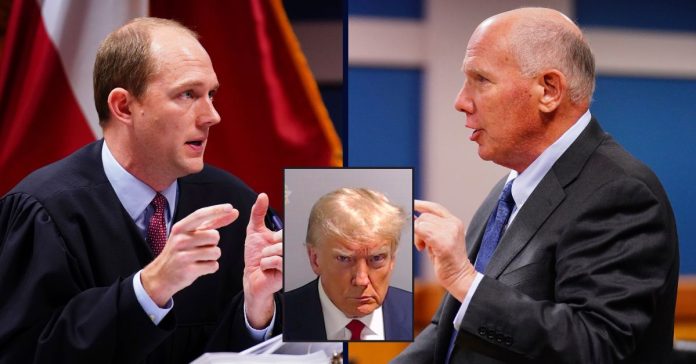
Left: Judge Scott McAfee speaks during a hearing in Superior Court of Fulton County as part of the Georgia election indictments on Friday, Dec. 1, 2023, in Atlanta. (John David Mercer/USA Today via AP, Pool). Right: Steve Sadow, attorney for Donald Trump, speaks in Superior Court of Fulton County before Judge Scott McAfee as part of the Georgia election indictments on Friday, Dec. 1, 2023, in Atlanta. (John David Mercer/USA Today via AP, Pool). Center: Donald Trump (via Fulton County (Ga.) Sheriff’s Office).
A lawyer representing former President Donald Trump in the criminal RICO case against him in Georgia wants the judge in the case to help him obtain a list of discovery from a separate federal matter — Trump’s pending election subversion case in Washington, D.C.
Attorney Steve Sadow asked Fulton County Superior Court Judge Scott McAfee during an hourslong hearing Friday if there was anything the judge could do to facilitate the acquisition of discovery material in the Washington, D.C., case, which he says contains information that significantly overlaps with issues in the Georgia case. It was one of multiple arguments raised before the judge, who was also asked to dismiss several counts from the indictment.
Sadow said he is asking for the list of discovery materials special prosecutor Jack Smith has provided to Trump’s lawyers in the Washington, D.C., case, which he described in a motion filed in Fulton County on Nov. 20.
“President Trump is not currently seeking access to the actual DC discovery material,” Sadow’s motion said. “Instead, he is seeking a practicable way to determine if any discovery material disclosed in the DC case is arguably relevant to our Case, e.g., relating to witnesses the DA’s office may call at trial or bearing on factual issues raised by the charges in the indictment likely to be in dispute at trial.”
According to emails attached to that filing, Trump lawyers in the D.C. case, Todd Blanche and Todd Lauro, told Sadow that U.S. District Judge Tanya Chutkan’s protective order in their case bars them from sharing the requested information.
“Please understand that, despite our opposition, the Court entered a protective order (attached) that appears to restrict our ability to share information with others — including President Trump’s counsel in other cases,” Lauro wrote in the Nov. 10 email to Sadow. As such, we are not able to share information designated by the federal prosecutors as ‘sensitive.’ Unfortunately, we believe that the information you have requested may be covered by the order and therefore we cannot share it with you.”
At Friday’s hearing, McAfee appeared to conclude that taking action at this point would be premature, although he did acknowledge that “there’s a good deal of overlap” between the two matters.
“Remarkably,” Sadow agreed. He noted that he would likely file subpoenas to get the documents, although in his motion he tried to enlist aid from the office of Fulton County District Attorney Fani Willis as well, offering two possible paths.
“The DA’s office contacts the SCO to determine if the SCO will disclose the letters and lists to the DA now that a protective order has been entered in our case,” Sadow suggested in the filing. Alternatively, Sadow offered, McAfee “contacts the district court in the DC case to determine if suitable arrangements can be made to disclose the letters and lists to this Court for disclosure to the DA’s office and President Trump’s undersigned defense counsel.”
As a third alternative, Sadow sought permission from McAfee to subpoena the documents.
Sadow made it clear that he was “not suggesting that the state has a legal responsibility to obtain the documents” he wants and that he doesn’t have evidence “to show there has been an exchange of information with the special counsel’s office.”
In court on Friday, Sadow said he anticipated that the office of special counsel Jack Smith would “fight this all the way through.”
Georgia prosecutors, for their part, declined to engage with the substance of the request.
“[We’re] not going to provide any kind of response,” prosecutor Donald Wakeford said Friday. “This investigation is independent from any case that is anywhere else involving defendant Trump, and any defendants at the table.” Wakeford added that Willis’ office doesn’t have authority over the Department of Justice and “certainly” not over Chutkan, “and at this stage there is no role for us to play absent this court directing how we should move forward.”
“We have to stand mute on that because that’s not our business,” prosecutor Nathan Wade later said. “Counsel should start with his subpoena.”
In the end, it was determined that Sadow would try to obtain the documents via subpoena, and McAfee would revisit the issue later if necessary.
“We’ll put a pin in it for next time,” the judge said.
Sadow also engaged in a back-and-forth over the trial date in the matter, following Willis’ request that the case be heard in August 2024 — mere months before the presidential election, in which Trump appears to be the front-runner for the Republican nomination.
Sadow signaled that starting the trial at that time, which Willis anticipated could last for months, is tantamount to election interference.
“Can you imagine the notion of the Republican nominee for president not being able to campaign for the presidency because he is in some form or fashion in a courtroom defending himself?” Sadow asked. “That would be the most effective election interference in the history of the United States.”
Wade dismissed that idea.
“This trial does not constitute election interference … I don’t think it in any way impedes defendant Trump’s ability to campaign or do whatever he needs to do to seek office,” the prosecutor said.
McAfee didn’t rule on the issue Friday and indicated that additional efforts by the defense to dismiss aspects of the complaint will be addressed at a later time.
Have a tip we should know? [email protected]

